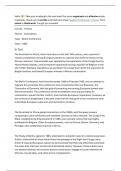Hello ! Take your studying to the next level! For more organized and effective study
materials, check out my profile and flashcard shop Maggie's Flashcards - Payhip. From
notes to flashcards, I've got you covered!
Course : History
Theme : Colonialism
Topic : Berlin Conference
Years : 1885
In Text
The Scramble for Africa, which took place in the late 19th century, was a period of
intense competition among European powers to colonize and claim territories on the
African continent. This scramble was sparked by the exploration of the Congo River by
Henry Morton Stanley, a secret explorer appointed by King Leopold II of Belgium in the
late 1870s. Stanley's expeditions up and down the Congo River led to the expansion of
Belgian territory and fueled European interest in African colonization.
The Berlin Conference, held from November 1884 to February 1885, was an attempt to
regulate this scramble. The conference was convened by Otto von Bismarck, the
Chancellor of Germany, with the goal of preventing war among European powers over
African territories. The conference aimed to establish rules and principles for
colonization, prevent further conflict, and promote European cooperation. However, as
the conference progressed, it became clear that the real goals of the conference were
to facilitate European expansion and domination of Africa.
The Scramble for Africa gained momentum in the 1880s, with European powers
competing to claim territories and establish colonies on the continent. The Congo Free
State, established by King Leopold II in 1885, was a private colony that was highly
profitable for Belgium. Other European powers, such as France, Britain, Germany, and
Portugal, also established colonies in Africa.
The Treaty of Berlin, signed in 1885, attempted to establish rules for colonial expansion.
Article I stated that all ships would have free passage in the Niger and Congo rivers;
Article II required European nations to demonstrate that they had effectively colonized
the areas they claimed; and Article III abolished slavery. However, these articles were
not always followed, and colonial powers continued to engage in brutal treatment of
Africans, forced labor, and other forms of exploitation.
, The Scramble for Africa had devastating consequences for the indigenous populations
of Africa. Artificial borders were drawn without regard for local cultures or traditions,
dividing communities and leading to conflicts over resources. Many Africans were
forced into forced labor or subjected to brutal treatment at the hands of colonial
authorities. The scramble also led to a chain reaction of land grabbing, as European
powers competed for territory and resources.
Despite its intentions to promote cooperation among European powers, the Berlin
Conference ultimately accelerated rivalries and competition for African territories. The
British, for example, hoped to unite Egypt and South Africa by building a railway across
the continent. However, this project was ultimately abandoned due to lack of funding
and other complications.
The legacy of the Scramble for Africa continues to be felt today. The artificial borders
created during this period continue to shape African politics and economies, while the
legacy of colonialism remains a source of tension and conflict on the continent.




